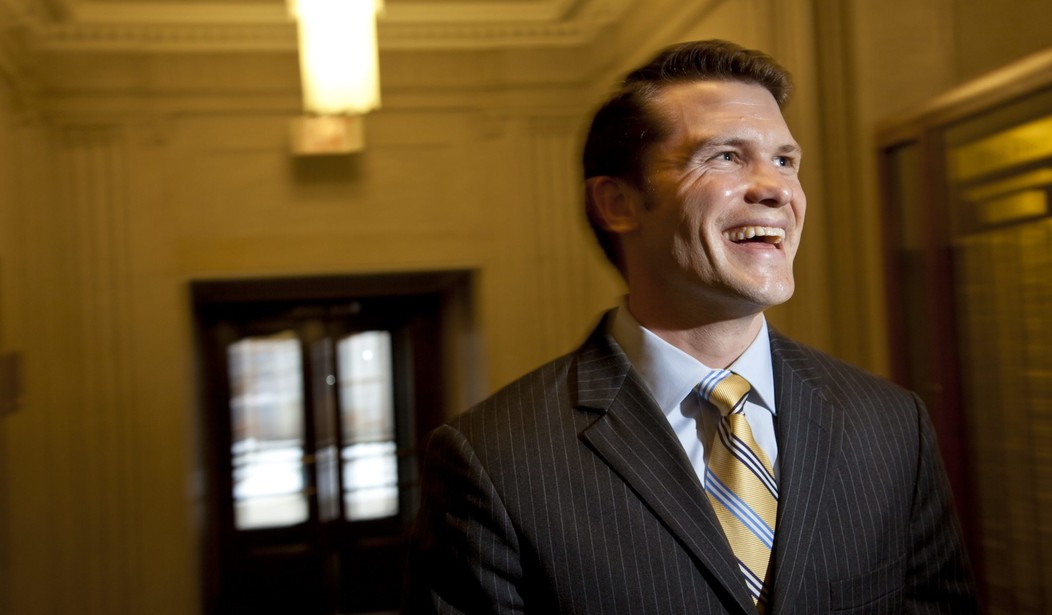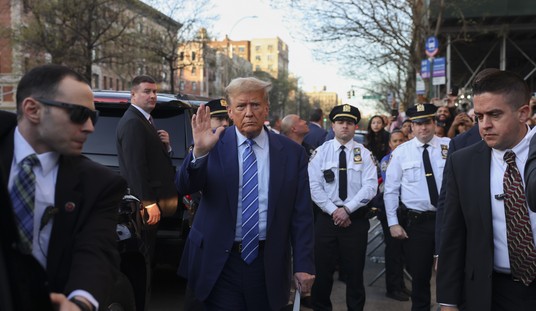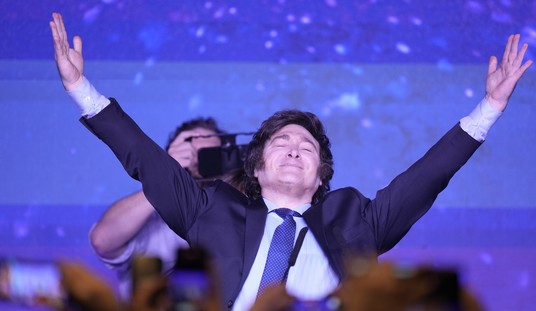Occasionally, the circumstances of an introduction set you up to dislike someone whom you might otherwise admire. So it was when I discovered Pete Hegseth in 2012.
I was a volunteer on the campaign of Dan “Doc” Severson for U.S Senate in Minnesota. Doc was seeking the Republican Party endorsement to challenge Democrat incumbent Amy Klobuchar. I had seen Doc in attendance at a number of Tea Party meetings and similar activist gatherings around the Twin Cities metro. He was, and remains, a good man who understands and upholds the Constitution. When I learned that some upstart named Pete Hegseth — whom I had never seen or heard of — was going to make a late entry into the endorsement race, I was inclined to dislike the presumptuous bugger.
All I knew about Hegseth at that time was that he was finishing a tour of duty in Afghanistan. That, of course, was a good thing. But given the fact that he was challenging my guy, I was obligated to conjure reasons to oppose him. That wasn’t hard in the year of Ron Paul’s second run at the presidency, a cycle which saw a huge influx of new liberty-minded anti-war participants in the endorsement process. Hegseth was easily fashioned as the poster child for everything these new folks hated about the GOP. To them, combat veteran was not necessarily a qualification, especially when this particular veteran had gone out of his way to promote a stronger commitment to victory in the War on Terror. His term membership in the Council on Foreign Relations, a boogeyman group in certain Tea Party circles, also worked against him. So too did his background in the Ivy League. Princeton would serve as a credential in any other context. But this was the era of the anti-establishment. Hegseth’s resume was — ironically — too good.
Alas, neither Hegseth nor Doc prevailed in that endorsement contest, and the guy who did went on to lose big to the liberal Klobuchar. On our side, in the long run, nobody got what they wanted. That’s politics.
With the context of a political campaign no longer clouding my judgment, I began to follow Hegseth with interest. Here was a hometown boy from Forrest Lake, Minnesota — a place I knew well and had frequented — who had accomplished much in a relatively short time. After Princeton, Hegseth served in the Army National Guard with tours in Iraq, Afghanistan, and Guantanamo Bay. As if that weren’t enough, he served as CEO of the veterans advocacy organization Concerned Veterans for America and chairman of the policy group Vets for Freedom. You probably know him best as a Fox News contributor who regularly appears on “Fox & Friends,” “The Kelly File,” and “Outnumbered.” Hegseth has remained active in party politics as well. He spoke at this year’s Republican Party of Minnesota state convention, and has served as a delegate to various conventions.
The more I have seen from Hegseth since 2012, the more I like him. Sure, we could split a few ideological hairs in a debate. However, I would take Hegseth’s wrong over most people’s right any day of the week. That’s especially true after reading his book, released earlier this year, In the Arena: Good Citizenship, a Great Republic, and How One Speech Can Reinvigorate America. In it, Hegseth breaks down a speech delivered by Teddy Roosevelt at the Sorbonne in Paris on April 23, 1910. You may recall its most famous excerpt.
It is not the critic who counts; not the man who points out how the strong man stumbles, or where the doer of deeds could have done them better. The credit belongs to the man who is actually in the arena, whose face is marred by dust and sweat and blood; who strives valiantly; who errs, who comes short again and again, because there is no effort without error and shortcoming; but who does actually strive to do the deeds; who knows great enthusiasms, the great devotions; who spends himself in a worthy cause; who at the best knows in the end the triumph of high achievement, and who at the worst, if he fails, at least fails while daring greatly, so that his place shall never be with those cold and timid souls who neither know victory nor defeat.
Hegseth’s book serves as a rallying call for such citizens, those who would enter this proverbial arena. His message, which effectively applies the principles articulated by Roosevelt, proves unlike anything we hear in today’s national conversation.
In a time of grand cynicism during which so many sense that their government serves an interest other than their own, our political discourse has devolved into a contest between special interests, leaving any concept of national interest behind. Substantive policy proposals and assertions of character have given way to snarky tweets and the demonization of the other. This occurs not just between the two major political parties, but within them. The Tea Party, which I came up through, has metastasized from a forum for knowledge and inspiration into an ideological inquisition that seeks to scourge the impure.
From Roosevelt’s speech, a particular passage speaks into this moment:
Of one man in especial, beyond any one else, the citizens of a republic should beware, and that is of the man who appeals to them to support him on the ground that he is hostile to other citizens of the republic, that he will secure for those who elect him, in one shape or another, profit at the expense of other citizens of the republic. It makes no difference whether he appeals to class hatred or class interest, to religious or antireligious prejudice. The man who makes such an appeal should always be presumed to make it for the sake of furthering his own interest. The very last thing an intelligent and self-respecting member of a democratic community should do is to reward any public man because that public man says that he will get the private citizen something to which this private citizen is not entitled, or will gratify some emotion or animosity which this private citizen ought not to possess…
If a public man tries to get your vote by saying that he will do something wrong in your interest, you can be absolutely certain that if ever it becomes worth his while he will do something wrong against your interest.
We need not unpack that. Even the most obtuse reader can infer to whom this passage applies. We now have, in both parties, a proliferation of candidates and rhetoric which promise to support us “on the ground of hostility toward other citizens.” The problem is the rich! The problem is the poor! The problem is this religion, or that race, or this creed. No. The problem is a lack of personal responsibility and public decency. The problem is piss-poor character among too many from every strata. We can and must do better because, as Roosevelt points out:
The average citizen must be a good citizen if our republics are to succeed. The stream will not permanently rise higher than the main source; and the main source of national power and national greatness is found in the average citizenship of the nation. Therefore it behooves us to do our best to see that the standard of the average citizen is kept high; and the average cannot be kept high unless the standard of the leaders is very much higher.
As we look back upon such leaders, we note their capacity to apply principle to the craft of real-world policy. That does not always look perfect to the ideological critic. Roosevelt clarifies his “man in the arena” imagery by fleshing out that point:
The citizen must have high ideals, and yet he must be able to achieve them in practical fashion. No permanent good comes from aspirations so lofty that they have grown fantastic and have become impossible and indeed undesirable to realize. The impractical visionary is far less often the guide and precursor than he is the embittered foe of the real reformer, of the man who, with stumblings and shortcoming, yet does in some shape, in practical fashion, give effect to the hopes and desires of those who strive for better things. Woe to the empty phrase-maker, to the empty idealist, who, instead of making ready the ground for the man of action, turns against him when he appears and hampers him when he does work! Moreover, the preacher of ideals must remember how sorry and contemptible is the figure which he will cut, how great the damage that he will do, if he does not himself, in his own life, strive measurably to realize the ideals that he preaches for others. Let him remember also that the worth of the ideal must be largely determined by the success with which it can in practice be realized.
This is something I have come to learn through my growth from activist to commentator to public official. Ideology has its limits. If an idea does not work where the rubber meets the road, then it should be set aside as a topic for another day. That’s heresy in today’s party politics, which places undue weight on adherence to what Roosevelt called “closet philosophy,” and completely neglects the question of how ideas can be applied in the real world.
The closet philosopher, the refined and cultured individual who from his library tells how men ought to be governed under ideal conditions, is of no use in actual governmental work…
Amen.
Hegseth’s book breaks down these passages and much more from Roosevelt’s speech. The net effect will leave you inspired and primed to enter the arena yourself.
Many find themselves turned off by the presidential election and its surrounding discourse. It can be tempting in that context to disengage and succumb to cynicism. Hegseth’s evocation of Roosevelt reminds us that nothing decent ever happens without good people getting “marred by dust and sweat and blood.” Success in any effort is never guaranteed. But a failed attempt has infinitely more honor than never bothering to try.








Join the conversation as a VIP Member